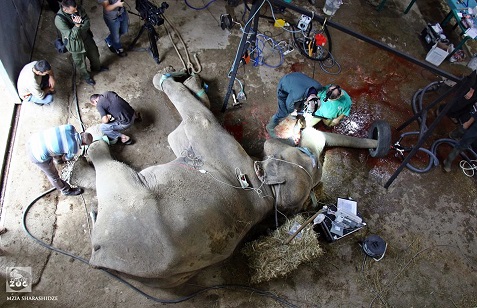Surgery a success for Tbilisi Zoo elephant [VIDEO]

One of Tbilisi Zoo’s largest residents has survived a complicated surgery to remove a large infection.
International veterinarian surgeons operated on an elephant named Grandi to remove a portion of his infected tusk. They said there was a chance Grandi would not wake from the surgery.
The operation itself, which took place at Tbilisi Zoo on Wednesday, was more complicated than expected and lasted for several hours. British veterinary surgeons used an electric drill to remove the infection from Grandi’s tusk.
Veterinarians said Grand’s heartbeat and vital signs were normal after the surgery however there was a risk the elephant would not wake from the anesthetic.
The experts said it was common after major surgery for animals never to regain consciousness but in Grandi’s case it all ended well.
As he awoke from his drug-induced-sleep, Grandi appeared extremely drowsy and needed assistance to stand up.
The surgery started at 10am on September 18 and on the day almost everyone in Georgia wished the elephant a successful surgery.
Tbilisi Zoo had a screen installed at the Zoo’s information centre where journalists, supporters and animal-lovers watched the surgery progress.
Grandi weighed about six tonnes and because of his immense weight, when he lay down, his entire mass pressed down on his lungs. This could potentially constrict the lungs, resulting in respiratory arrest, the English veterinarians said.
Despite the success of the surgery, Grandi is not out of the woods. The added complications meant the veterinary surgeons could not operate on Grandi’s other tusk, which was also infected. This operation was scheduled to take place two years from now.
 Tweet
Tweet  Share
Share